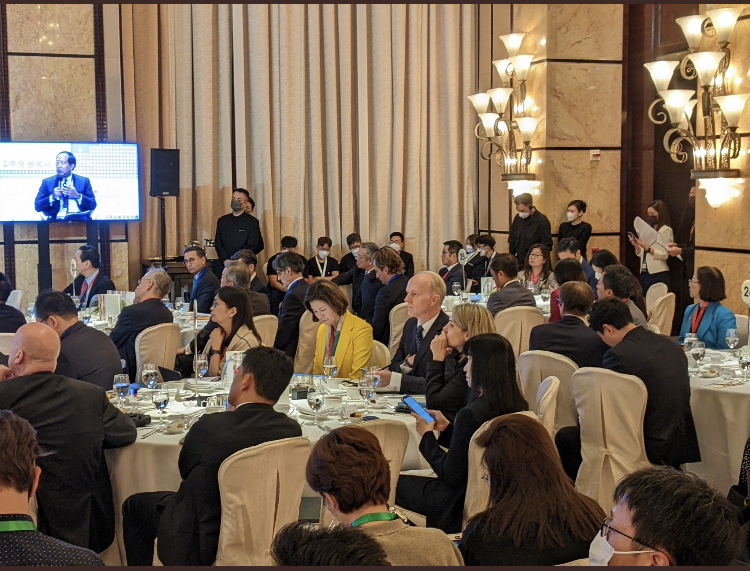
MIX: In a world where international business and travel takes place more often, how should event coordinators go about planning an event that hosts people from a variety of cultures?
STEVEN PARKINSON (SP): Culture means different things to different people, but my favourite definition is “culture is the software of the mind”. I think the first important thing for event planners to remember is to look beyond the visible cultural differences – language, religion, dress – to the underlying values and attitudes, which will give you a better understanding of why people come to the table with different expectations.
MIX: Welcome receptions and meals to kick off an event immediately bring up the issue of naming, titles and introductions. How do you make sure that this is handled with grace?
SP: First and second names often appear in a different order, depending on where you are from. In China, the surname comes first; and in most Western European countries the reverse is true. However, in Spain many people have two surnames; in some Muslim countries, their name is their father’s with a “bin” preceding; and in Japan, you would often call a work colleague by their last name, followed by “san”.
Make sure that registration forms are clear in terms of where attendees’ first and second names should be written, and what they would like to be called if that is different from their given name.
Also, introductions have a greater sense of propriety in some cultures than others. Australia has a relatively informal culture in this sense, for example.
While in China the exchange of business cards requires close attention because business cards are considered to be almost an extension of the person themselves. Rather than sliding your business card across a conference table as you might be able to in the USA, it needs to be received and looked at carefully.
Familiarity in terms of communication surrounding an event is something to be addressed as well.
In the USA, it wouldn’t be uncommon to receive an email that addressed you by your first name even if that person didn’t actually know you, whereas in other cultures such as France or Japan, that would be considered overly familiar and wouldn’t sit well.
MIX: Food preference, restrictions and the time and attention paid to meals differ around the globe. How do you bring people together and make sure you haven’t offended your guests?
SP: In France lunch is at 1pm. In the States it could be noon. In Spain it’s more like 2pm. In Asia there are also wide variations. In some European countries including Italy and France, having a proper meal is highly valued no matter how senior or busy you are. In certain Anglo-Saxon cultures, having a sandwich at your desk, or in the case of a corporate event, serving a light lunch during a meeting is completely acceptable.
If you are organising a meal that’s based on another culture’s cuisine, there are varying customs to consider. If Indian food is eaten without utensils, then you serve with the left hand and eat with the right. If chopsticks are used, you may need a knife and fork option for those who don’t know how to use them. There are logistical considerations that should be tackled early on in the preparatory process.
Most importantly, conference organisers need to make sure there is the right range of dietary options available given the attendees and that on any registration form, it’s possible to indicate those preferences. In the case of Hindu, Muslim or Jewish participants, certain foods may not be permitted, so meal options should be made available without making delegates feel like outsiders.
MIX: How do guest speakers factor into how participants view an event or conference?
SP: Event planners need to look at the reality of business in a particular country to get a better sense of how to factor speakers in. In China, having a high-ranking government representative can be extremely attractive, especially given that in Chinese business culture the interactivity with the Chinese government is higher than it is in, say, Australia. So you need to understand how important (or not) it is to the audience to have a high-level guest speaker recognised.
MIX: The way that delegates approach negotiations, problem-solving, breakout sessions and presentations is varied. How do you go about appreciating those differences and incorporating them into your event?
SP: In this age where everyone is using PowerPoint, there is a tendency to keep presentations short and sweet to get to the point as quickly as you can. That’s a very Anglo-Saxon approach. But in other countries – France is a good example – participants need to understand the depth and context of the logic. For them, something that is short and sweet may come across as superficial.
Similarly, the style of breakout sessions is vital, owing to the fact that in certain cultures the issue of saving face is key. It can be difficult for individuals – Thais, Japanese or Koreans – to enter into a brainstorming session where you’re discussing new, untested ideas with individuals you don’t know. On the other hand, in the Netherlands or the UK, that wouldn’t be a problem.
In terms of decision-making, some cultures expect to get together, have a debate, and make decisions in the confines of a meeting. There are other cultures – France or certain Middle Eastern countries, for example – where making decisions within a certain fixed time frame, when not all the issues have been fleshed out sufficiently, would be seen as premature.
When it comes to negotiations, some cultures are more relationship-focused than task-focused. For Brazil, Mexico, the United Arab Emirates for instance, the idea is “I want to trust you before I do business with you”. But in more task-focused places like the US or Germany, the basic understanding is “Let’s get down to business”. If you are working with those who are more relationship-focused, an event organiser needs to allow more time for that initial networking and getting to know you portion to allow the relationships to develop before you can reasonably expect people to do business together.
MIX: That brings us to the idea of leadership and hierarchy in global organisations; how do those views vary?
SP: In a situation where you bring together a large group of people who do the same job in different countries, there are often striking differences in the way a leader is expected to direct a group. The role of a leader in Japan, India or Spain, where there’s a high level of hierarchy in the workplace, is that of being an expert, being someone who makes the decisions. So in the context of a larger meeting, some expect a leader to lay down what is going to happen, what is expected of the individuals present,and the strategy they are going to use.
However, in other cultures where there’s a much flatter hierarchy – Scandinavian countries, the US and the UK , for instance – there’s a more consensual decision-making process. For those individuals, they would come expecting discussion, interaction, and an opportunity to provide thoughts and feedback in conjunction with the leader.
One of the challenges for event organisers who bring these people together in one room, is to meet the varying expectations of managers that are part of a global team.
MIX: With all of these varying approaches to meals, meetings and negotiations, how do you make sure the event itinerary runs smoothly?
SP: Before coming to us, one of my clients made a business trip to Abu Dhabi. In planning his trip, he set up five appointments per day to try and accomplish as much as possible. But, by starting and ending his meetings on time just to get through the day, he was in fact coming across as being very impolite because their approach to time was very different. For him it was “let’s talk business”, and for them, the idea is that a meeting should end when the right things have been discussed.
Some people come from cultures where time is seen as a resource that is there to be managed and controlled in the best way we can. Others see time as something that is ultimately controlled by a higher power. You have to realise that there is a deeper set of values and attitudes that drives visible behaviour, and seeking to understand and adapt to these is the key to success.
To learn more about TMA visit the company website at www.tmaworld.com
When the differences are in the details
• Be as informed as you possibly can about the various cultures you are working with – talk to people in the company, look at websites (such as www.countrynavigator.com), read up – try to understand what some of the potential cultural differences that you are going to come across.
• Think about what impact those differences could have on your event. If you are holding a banquet, the food is obviously a major factor to consider and the values that surround food and mealtimes. If this is a sales conference, understanding how people work with each other and view hierarchy, leadership and their place in the organisation is key. Alternatively, an offsite intended to problem solve may mean you need to understand how different cultures approach business discussions.
• Strategise what you are going to do to adapt based on these factors, or introduce flexibility into an event to take into account the impact of those differences.
• Apply this know-how and talk to potential key participants so that you – and they – understand the strategies that will be put in place to make it work .
• Ensure your registration form is clear about names, titles, dietary restrictions and any other information that is culturally sensitive.
• If there is a particular destination whose customs you need people to know beforehand, make up a list of tips and/or information to be placed in every delegate’s hotel room.
Considerations to remember
The number four is considered unlucky in China and Korea
Greet the eldest first when meeting a group of Indian, Chinese, Japanese or Korean businessmen
In Thailand, the person of lowest status is introduced first
In the Philippines, Mr President or Ms Executive should not be followed with given names; formality is of the utmost importance
Left-handed businesspeople should make sure that ribbon-cuttings, handshakes and eating are done with the right hand as the left hand is regarded as inauspicious in Islamic cultures, the Indian subcontinent and much of West Africa
If invited to an associate’s home in Mexico, don’t bring up business until your host does
Never refer to a female hosting an event in the Philippines as a “hostess”; it translates into “prostitute”
During business meetings, the most senior Japanese businessperson should be seated furthest from the door
If it’s offered, always accept tea in Bahrain
In Saudi Arabia, you should arrive for meetings on time, though it is acceptable to keep foreigners waiting
In many Asian cultures, white flowers are used for funeral services and burials only
Many French don’t work in August, so trying to get negotiations accomplished may prove difficult
Never ask a Chinese business partner to turn off his mobile phone
Turning down a social invitation in Italy is considered very rude, even if you are there on business
In the Netherlands, lunch is not the time to discuss business matters
In Malaysia, whistling indoors brings bad luck and should be avoided
In Argentina, it’s considered rude for a foreigner to ask what someone does for a living in a social situation. Wait for the other person to bring it up first
Passing something over the head of a Cambodian is a no-no as the head is considered sacred in their culture
Don’t leave chopsticks upright in your bowl, it looks like incense sticks for departed spirits
A French colleague may be suspicious if you act overly friendly and ask personal questions up front
Australians often use colourful language in business negotiations that would be considered unthinkable in other cultures
Giving the thumbs up sign in Egypt is much like giving the middle finger in the UK
If you give a gift in Singapore, give it to the company, not the individual. Personal gifts have historically been regarded as bribes
Shaking hands in Vietnam means waiting for someone of the same sex to initiate a handshake. Men and women shaking hands could be construed as a public display of affection


